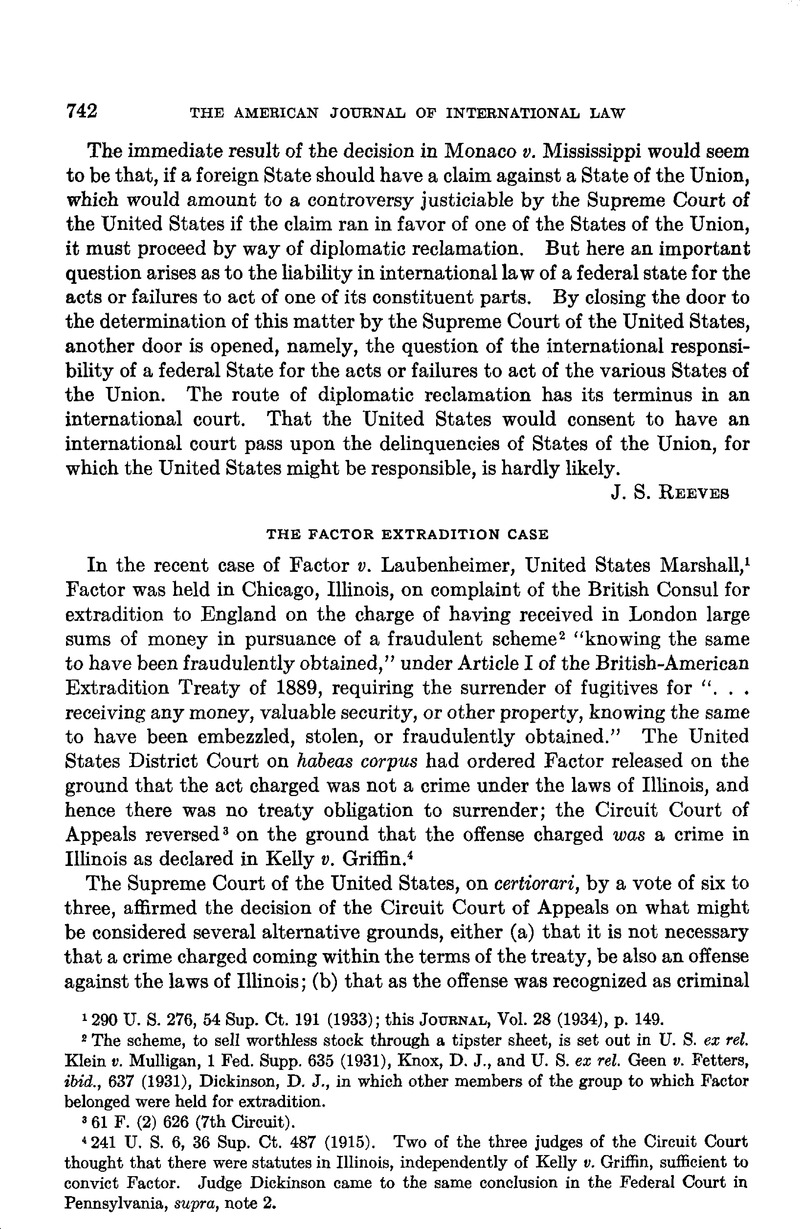Article contents
The Factor Extradition Case
Published online by Cambridge University Press: 12 April 2017
Abstract

- Type
- Editorial Comment
- Information
- Copyright
- Copyright © American Society of International Law 1934
References
1 290 U. S. 276, 54 Sup. Ct. 191 (1933); this Journal, Vol. 28 (1934), p. 149.
2 The scheme, to sell worthless stock through a tipster sheet, is set out in U. S. ex rel. Klein v. Mulligan, 1 Fed. Supp. 635 (1931), Knox, D. J., and U. S. ex rel. Geen v. Fetters, ibid., 637 (1931), Dickinson, D. J., in which other members of the group to which Factor belonged were held for extradition.
3 61 F. (2) 626 (7th Circuit).
4 241 U. S. 6, 36 Sup. Ct. 487 (1915). Two of the three judges of the Circuit Court thought that there were statutes in Illinois, independently of Kelly v. Griffin, sufficient to convict Factor. Judge Dickinson came to the same conclusion in the Federal Court in Pennsylvania, supra, note 2.
5 Mr. Hudson, , in a competent article on the case, “The Factor Case and Double Criminality in Extradition,” this Journal, Vol. 28 (1934), p. 274 Google Scholar at 303, n. 120, remarks that the number is inaccurate, a Harvard investigator having established that only sixteen States make the act a crime. There is doubt as to five of these, he reports.
6 In the Circuit Court of Appeals, the British Consul appears to have argued that criminality in Illinois is not essential. See also U. S. ex rel. Geen v. Fetters, supra, note 2.
7 Supra, note 5.
8 Meaning, “He who considers merely the letter of an instrument goes but skin-deep into its meaning.” Broom's Legal Maxims, 8th ed. (London, 1900), p. 533, citing Coke's Littleton, 283b. Cf. St. Paul's proverb, “the letter killeth but the spirit giveth life,” Corinthians II, ch. 3, verse 6, both cited by John Bassett Moore in International Law and Some Current Illusions, New York, 1924, pp. 20, 21, doubtless with Stoehr v. Wallace, 255 U. S. 239, 41 Sup. Ct. 293 (1921), in mind, where a literal construction of the treaty word “residing” produced an unsound conclusion of law, in effect privileging the confiscation of the property of non-resident alien owners.
9 This statement is ventured notwithstanding the remark of Fuller, C. J., in Wright v. Henkel, 190 U. S. 40, 58, 23 Sup. Ct. 781 (1903), that it is a “general principle of international law.” Chief Justice Fuller was not always happy in his generalizations on international law.
10 See the references to the Appendix to Petitioner's Brief on Reargument in Hudson, supra, note 5, p. 299.
11 Hudson, loc. cit., 285; cf. Collins v. Loisel, 259 U. S. 309, 42 Sup. Ct. 469,470 (1922), and other cases cited in 61 Fed. (2) 626, 632.
12 Hudson, loc. cit, 296.
13 Cf. Benson v. McMahon, 127 IT. S. 457, 466, 8 Sup. Ct. 1240, 1244 (1888): ”… we do not see that in this application to set the prisoner at large, after he has been once committed by an examining court having competent authority, and after having been held to answer in Mexico for the offense charged, this court is bound to examine with very critical accuracy into the question as to whether or not the act committed by the prisoner is technically a forgery under the common law. Especially is this so when the wickedness of the act, the fraudulent intent with which it was committed, and the final success by which the fraud was perpetrated, are undoubted.” See also Kelly t>. Griffin, 241 U. S. 6,14: ”… . The treaty is not to be made a dead letter because some possible false statements might fall within the Canadian law that perhaps would not be perjury by the law of Illinois.” Cf. other quotations in 61 Fed. (2) 626, 631, 632.
- 1
- Cited by




